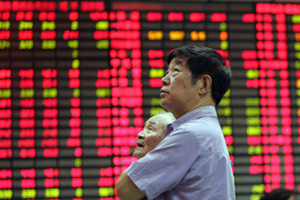Investors hoping that China's dramatic stock market bull run will persist
through 2007 take heart: history appears to be on your side.

A man stands in front of an
electronic stock board in the stock market of Shanghai June 19,
2006.[Reuters] |
Olympic hosts seldom make a penny
but their equity markets have historically racked up big gains from the hoopla
and buoyant sentiment surrounding the event.
With Beijing the venue for the 2008 Summer Games, analysts argue that a rally
that helped Shanghai become the world's best-performing major market in 2006
could extend into 2007. Hong Kong should also benefit with a large swathe of
China Inc. already listed in the city.
Most agree that markets are sharply overbought -- Hong Kong's bourse is
trading at above 16 times historic earnings, versus a more sustainable
historical average of 12 to 13 -- and could undergo a consolidation. The H-share
index has already fallen 10 percent since January 3.
But with strong fundamentals for Chinese stocks -- from sportswear vendors
such as Li Ning to hotel operators such as Jinjiang Hotels -- market pundits are
calling for another robust year.
"Confidence, investment, and efficiency gains brought by the Olympics will
boost the economy and may translate into higher earnings," said Thomas Deng,
head of China research at Goldman Sachs. He expects the gauge of Hong
Kong-listed mainland enterprises to rise 22 percent in 2007 to 11,800.
In the past 11 Olympics, the local index of the host country has surged 25
percent on average in the 12 months before the Games year, Goldman Sachs said.
Of the six most recently held summer Olympics, all host nations scored
returns of at least the low-teens in the year before the Olympics, with
outperformers South Korea (1988), Greece (2004), and the United States (1996) up
90 percent, 29 percent and 33 percent, respectively.
"Expectations are self-fulfilling," said Paul Cavey, China economist of
Macquarie Research. "That investors believe 2008 matters for China necessarily
means it does."
CLEAN UP ACT
Markets appear to have little room to climb. China's benchmark Shanghai
Composite Index surged 130 percent in 2006, while Hong Kong's H-share index
nearly doubled.
Analysts warn that utilities and steel stocks might suffer if Beijing follows
Seoul's lead in forcing industrial facilities in and around Beijing to
temporarily close to clean up the city's notoriously polluted air.
Yet many investors believe little can go wrong before the Beijing Olympics
given the government's determination to make it a huge success. As seen with
Japan in 1964 and South Korea in 1988, the event will not only boost domestic
spending but also serve as a coming-out party for the host.
Olympic sentiment is particularly important in Asian markets, where
volatility is higher, says Aaron Boesky, chief executive of Marco Polo
Investments Group.
"This is a historical event for 1.4 billion people that will be repeated in
newsreels for the next 50 years," Boesky said. "The Beijing Olympics is double
the importance of (other Asian) Olympics, in terms of sentiment."
China plans to invest $40-$50 billion on roads and stadiums, according to JP
Morgan. That almost equals Kuwait's annual economic output but represents only 5
percent of China's annual fixed-asset investment.
BUY, BUY
Consumer, travel, and construction companies are likely to be major
beneficiaries. Li Ning, named after its Olympics gymnastics champion founder,
and Win Hanverky should see rising sportswear sales, according to CLSA.
CLSA also expects conglomerate Beijing Enterprises to benefit from increased
traffic on the highway linking the capital to the airport, in which it has a
stake. Its indirect subsidiary Yanjing Brewery, which makes Beijing's most
popular beer, is also expected to perform well.
Others expected to benefit from a surge in the number of visitors are hotel
operators Jinjiang and Home Inns, Air China and Beijing Capital International
Airport.
Even China Mobile Ltd. could enjoy higher call and short-message volumes,
CLSA said.
While investors should not get overly excited about the impact from the
Olympics, yuan appreciation and rising corporate earnings also support another
strong year for Chinese equities.
"Even without the Olympics, given the liquidity situation and all the
fundamentals, we can be bullish," said Frank Gong, JP Morgan's China economist.
"With the Olympics, there is a little further sentiment push that can boost the
market PE."
Table of benchmark performance in the year prior to the games among the most
recent six Olympics hosts:
1984 United States S&P up 17 percent
1988 Korea Kospi up 90 percent
1992 Spain IBEX up 33 percent *
1996 United States S&P 500 up 33 percent
2000 Australia ASX 200 up 14 percent
2004 Greece ASE up 29 percent
Note: Spain's performance based on IBEX35 Index over 18 months before
Olympics start, based on calculations by Marco Polo Investments Group.